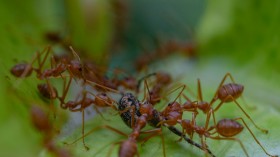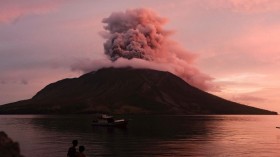Just when the Internet was shocked by the drama of the penguin love triangle, another penguin relationship has restored people's faith in love. Dotty and Zee, two Humboldt penguins who call Bremerhaven Zoo home, are celebrating their 10th anniversary together. Dotty and Zee are also both male, and their loyalty to each other has drawn the attention and admiration of many.
According to accounts from the zookeepers at Bremerhaven, Dotty and Zee had quickly taken a liking to each other. Every year, they would settle down and build a nest to attempt and start a family. After several failed efforts to produce offspring, tests were conducted to determine what was causing their reproductive problems. A simple DNA test administered by the zookeepers confirmed the reason behind their infertility: Dotty and Zee were of the same gender.
In an effort to encourage reproduction and increase the Humboldt penguin population, Bremerhaven Zoo introduced six female penguins to their colony. To the zookeeper's surprise, three out of the 10 penguin couples turned out to be gay. Humboldt penguins are monogamous as supported by the fact that the gay penguin couples did not switch partners even for the sake of reproduction.
To give them a chance at parenthood, Bremerhaven Zoo facilitated Dotty and Zee adopting a penguin egg that was rejected by a mother penguin. The penguin dads worked together to incubate the egg and shared the responsibilities for feeding and providing everything necessary for the baby. This is hardly considered unusual since same-sex penguin pairs have also been observed at zoos in Japan and New York. Scientists have found that more than 450 species of animals display gay behavior.
Humboldt penguins are classified as Vulnerable on the International Union for Conservation of Nature Red List since there are only 2,000 of these penguins left in the world. These penguins have been heavily hunted for meat, oil and skins and suffered from unsustainable egg collecting. The principal risks to Humboldt penguins are human over-harvesting of the fish stocks, their main food source, and natural predators such as foxes and wild dogs. Recent decades have whittled down the Humboldt penguin population due to the effects of El Niño. The Humboldt penguin population is harmed in two ways: by displacing the cold current of water running from the Antarctic to the equator along the west coast of South America with warmer, less food-rich water, and raising severe storms that can wash out the nesting colonies.
© 2024 NatureWorldNews.com All rights reserved. Do not reproduce without permission.
![Extreme Heat Wave in Africa’s Sahel Region That Killed 100 People Linked to Climate Change [Study]](https://1471793142.rsc.cdn77.org/data/thumbs/full/70226/280/157/50/40/extreme-heat-wave-in-africa-s-sahel-region-that-killed-100-people-linked-to-climate-change-study.jpg)




